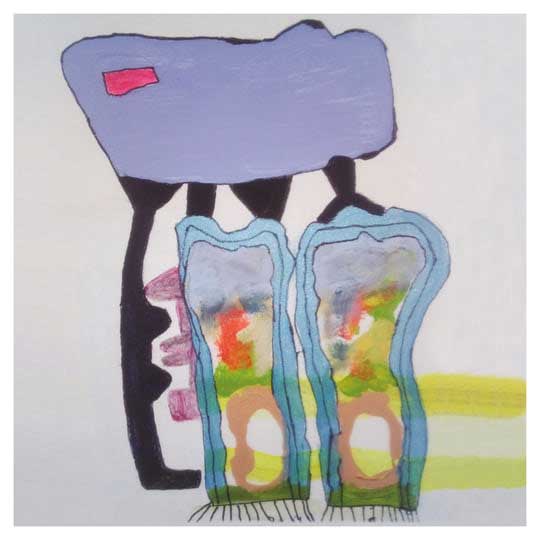
The New World, has turned out, sadly, to be the last album made by jazz and free improvisation percussionist Tony Oxley, who died over Christmas. Like his previous album, Beaming (2019), it’s a collaboration between himself and fellow percussionist Stefan Hölker. The two had worked together going right back to the 1990s, Hölker being one of the four drummers in Oxley’s Celebration Orchestra. Beaming was a series of elaborations on archive recordings made by Oxley in the 1970s. On it, Hölker played acoustic percussion while Oxley contributed electronics. The New World involves them working together in a similar way, but without archive material, Oxley again contributing electronics and incorporating sounds from close-mic’d found objects. However, in no way is it merely a rehash of the earlier album and fans of free improvisation will enjoy both. The album was recorded in 2022.
The title is playfully enigmatic. It could be seen as an ironic political comment on the state of things, or as describing a new way of doing things, a spontaneous, constructive musical dialogue that could serve, maybe, as a model for social change. It could be taken to have a hauntological ring to it: one could imagine it being the title of a BBC TV documentary; the year, perhaps, is 1970. Being easily impressed by transistorised devices back then, we watch, in awe, as James Burke interviews Oxley about the electronic gizmos he’s incorporated into his kit. Blue Peter for grown-ups. It could also be seen as referring generally to the world of improvised music, or, specifically, to the sound-world Oxley and Hölker create. One might even think of it as referring to the new ways of seeing (or, rather, hearing) invoked by Oxley’s found objects. If we take it to refer to the sound-world, it’s interesting to speculate when that world came into being. Listening to the album, I was more than once reminded of the classical music avant-garde of the 1960s. That a sound-world created sixty years ago still sounds new today – and it does – says a lot. Much of that music was tightly-structured and one of the great insights that has come from the rise of improvised music as a genre is that the ‘new world’ of sound created back then doesn’t need the formal rigour that classical composers often felt a need to give it. Musicians from both jazz and classical backgrounds quickly discovered you didn’t need a blackboard or a slide-rule to create to it. All you needed to do, once you had embraced the mindset and acquired the skills needed to do what you wanted to do, was pick up your instrument and play. And there was always the implication that what you could do in the world of music, you could do in the world at large. As Sun Ra put it, ‘There Are Other Worlds (They Have Not Told You Of)’.
The New World lasts just over fifty minutes and comprises of six tracks entitled ‘Composition’, numbered 1 to 6. In the first, dry, busy percussive activity interacts with what could be sounds produced by bowed metal or the results of ring modulation. Both musicians carefully restrict the vocabulary of sounds they permit themselves to use. This vocabulary is gradually enriched over the course of the album, but there is, throughout, a sense of almost classical restraint. On a micro-level, the music is inventive and endlessly engaging. I was put in mind of two people conducting a subdued but rich and enthusiastic conversation in the corner of a room, not quite out of earshot.
And what a conversation it is. Although there are six tracks, you have a sense that, when one comes to an end and another starts, it’s because you had to leave the room temporarily, not because the music ever stopped. You get the feeling Oxley and Hölker could’ve gone on for ever and never run out of things to say.
Dominic Rivron
Tony Oxley’s Obituary:
https://internationaltimes.it/tony-oxley-1938-2023/
Oxley and Hölker’s previous album, Beaming:
https://confrontrecordings.bandcamp.com/album/beaming
